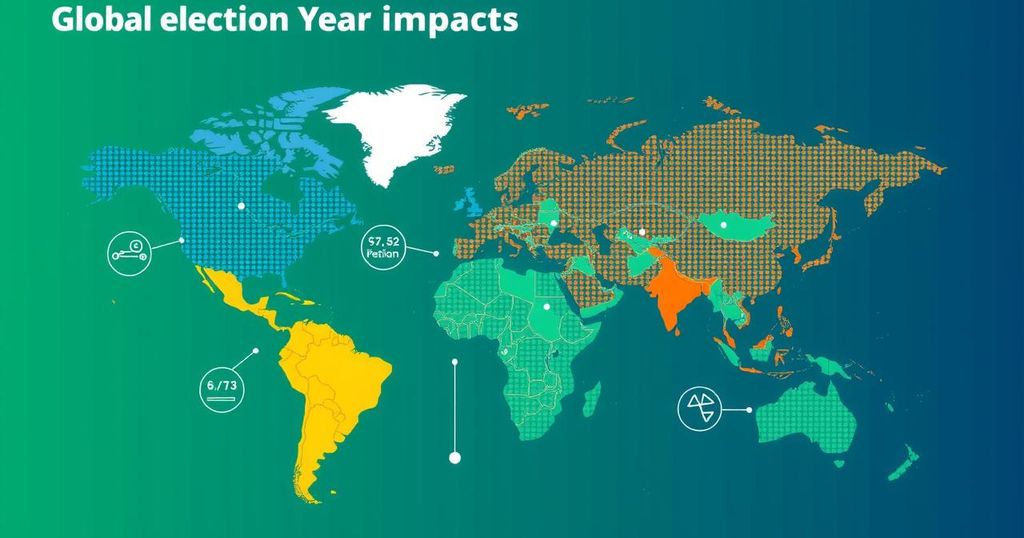Elections of 2024 Signal Eroding Commitment to Climate Action Worldwide

2024 has emerged as a pivotal election year globally, yet the commitment to combat the climate crisis is dwindling. Major elections have yielded victories for climate-skeptic politicians, while critical discussions on climate have receded in priority. Notably, the Cop29 climate summit showcased the struggle for strong climate action amid a backdrop of political reluctance. Overall, despite some localized victories, there is a significant trend of eroding focus on climate change amid other pressing issues.
The year 2024 is emerging as a significant election year worldwide, yet the commitment to tackling the climate crisis appears to be waning in numerous countries. Despite the rising occurrence of climate-related disasters and record temperatures, the political landscape is increasingly dominated by climate-skeptic ideologies. Influential political figures, such as Donald Trump and right-wing leaders in Europe, have gained traction by questioning the urgency of the climate emergency, diminishing efforts in climate activism that once flourished fervently just a few years ago.
The unprecedented number of elections globally, as noted by the United Nations, has revealed a trend where climate priorities have taken a back seat, overshadowed by pressing economic concerns, such as inflation and energy prices. Climate expert Catherine Fieschi emphasized that “in most advanced economies the big loser of the elections has been climate.” Despite the critical nature of the climate crisis, indicated by record-breaking temperatures and severe weather events, it seems to have become a subordinate electoral issue, particularly in light of other pressing global crises like the COVID-19 pandemic and geopolitical tensions.
In India, however, the climate crisis catalyzed farmer protests against extreme weather conditions, influencing prime ministerial elections. Conversely, Europe observed the rise of right-wing parties that characterized climate action as economically burdensome, while in the United States, the election of Trump heralded promises to dismantle environmental regulations that prioritize climate initiatives.
Despite a few victories for climate-conscious leaders in some regions, the general trend suggests a troubling stagnation of global momentum toward climate action. Political scientists caution against conflating populism trends with disinterest in climate issues, emphasizing the need for center-right parties to uphold climate commitments amidst rising pressures.
Global climate summits, such as Cop29, further illustrate the challenges facing climate negotiations. The absence of many prominent leaders at the conference, coupled with provocative statements from host country representatives, demonstrates a lack of serious engagement with climate issues. Activists have expressed discontent with the meager progress regarding emissions reductions and climate finance commitments at these gatherings, reflecting a growing concern among vulnerable nations regarding the commitment of historically polluting nations to climate action.
The article addresses the concerning decline in global commitment to addressing the climate crisis amid a series of significant elections across the world. As political figures who often dismiss the urgency of climate change gain influence, there is an observable retreat from previous climate mobilization efforts. The ongoing effects of climate change, expressed through extreme weather events, contrast sharply with the shifting political priorities, resulting in diminished public and governmental focus on environmental concerns.
In conclusion, the electoral landscape of 2024 indicates a precipitous decline in the political will to confront the climate crisis, even as climate-related disasters increasingly challenge global systems. Political movements enhancing skepticism toward environmental initiatives threaten past gains made by climate activism. While certain electoral victories maintain hope for climate action, the overarching trend suggests a retreat from urgent discussions and actions needed to combat climate change, emphasizing the critical need for renewed commitment at all levels.
Original Source: www.theguardian.com








